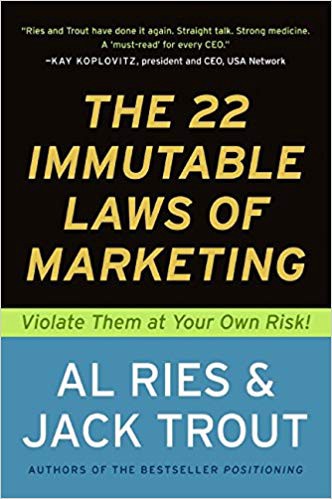Al Ries, Jack Trout
Published: 1994

Who are Al Ries & Jack Trout?
In their own words: Al Ries & Jack Trout are probably the world?s best-known marketing strategists. Along with Jack Trout, Ries is credited with coining the term ?positioning?, as related to the field of marketing
What This Book Is About:
If there are laws of the jungle and laws of the universe, there should also be laws that marketing professionals follow. These are the 22 laws of marketing.
Buy the book on Amazon
Big Lessons (or tl;dr version):
- Marketing is a battle of perceptions, not products or services.
- It?s better to be first than it is to be better.
- Create a category that you can be first in ? and make sure that the category is supported by a singular word.
- Fight the leader by not being better, but being their opposite.
- Don?t extend your brand through line extension; it rarely works. Plus, your brand is not the one that works, it?s the association with something.
- Study your customers, market and trends to find the ?one move? that works.
Notes
Chapter 1: The Law of Leadership
- It?s better to be first than it is to be better.
- The basic issue in marketing is not convincing prospects that you have a better product or service. The basic issue in marketing is creating a category you can be first in.
- It?s much easier to get into the mind first than to try to convince someone you have a better product than the one who got there first.
- The leading brand in any category is almost always the first brand into the prospect?s mind. E.g Hertz in rent-a-cars, IBM in computers, Coca-Cola in cola.
- Not every first is going to be successful. The timing could be an issue ? for e.g your first could be too late.
- Some firsts are also just bad ideas that will never go anywhere. E.g Frosty Paws, the first ice cream for dogs.
- The law of leadership applies to any product, brand or category.
- Imagine you didn?t know the name of the first college founded in America. You can always make a good guess by substituting leading for first. What?s the name of the leading college in US? Most people would say Harvard, and that is indeed the name of the first college founded in America.
- One reason why the first brand tends to maintain its leadership is that the name often becomes generic. Xerox, the first plain-paper copier became the name for all plain-paper copies. Kleenex. Coke. Scotch tape.
Chapter 2: The Law Of The Category
- If you can?t be first in a category, set up a new category you can be first in.
- Example: What?s the name of the third person to fly the Atlantic Ocean solo? You probably don?t know. Yet you do. It?s Amelia Earhart. But she isn?t known for that. She is known as the first woman to do so.
- IBM was the first in computers. DEC competed by becoming the first in minicomputers.
- Cray Research came up with the first supercomputer. Today, Cray is an $800 million company. Convex put two and two together and came up with the first mini super-computer. Today Convex is a $200 million company.
- You can turn an also-ran into a winner by inventing a new category. Commodore was a manufacturer of home PCs that wasn?t going anywhere until it positioned the Amiga as the first multi-media computer.
- There are many different ways to be first. Dell was the first to sell computers by phone.
- When you launch a new product, the first question to ask yourself is not ?How is this new product better than the competition??, but ?First what??
- Forget the brand. Think categories.
- Everyone is interested in what?s new. Few people are interested in what?s better.
- When you?re the first in a new category, promote the category. In essence, you have no competition.
Chapter 3: The Law Of The Mind
- It?s better to be first in the mind than it is to be first in the marketplace.
- The law of the mind modifies the law of leadership.
- Being first in the mind is everything in marketing.
- Being first in the marketplace is important only to the extent it allows you to get in the mind first.
- Marketing is a battle of perception, not product, so the mind takes precedence over the marketplace.
- The problem for would-be entrepreneurs is getting the revolutionary idea or concept into the prospect?s mind.
- The conventional solution is money. But it?s not. More money is wasted in marketing than any other human activity.
- You can?t change a mind once it?s made up.
- The single most wasteful thing you can do in marketing is try to change a mind.
- Having a simple, easy-to-remember name helps get into prospect?s minds.
Chapter 4: The Law of Perception
- Marketing is not a battle of products, it?s a battle of perception.
- It?s an illusion. There is no objective reality. There are no facts. There are no best products.
- All that exists in the world of marketing are perceptions in the minds of the customer or prospect.
- The perception is the reality. Everything else is an illusion.
- Marketing is a manipulation of these perceptions.
- Most marketing mistakes stem from the assumption that you?re fighting a product battle rooted in reality.
- What some marketing people see as the natural laws of marketing are based on a flawed premise that the product is the hero of the marketing program and that you?ll win or lose based on the merits of the product.
- This is why the natural, logical way to market a product is invariably wrong.
- Only by studying how perceptions are formed in the mind and focusing your marketing programs on those perceptions can you overcome your basically incorrect marketing instincts.
Chapter 5: The Law Of Focus
- The most powerful concept in marketing is owning a word in the prospect?s mind.
- Not a complicated word, or an invented word. Simplest words are the best, words taken right out of the dictionary.
- You ?burn? your way into the mind by narrowing the focus to a single word or concept.
- The law of leadership enables the first brand or company to own a word in the mind of the prospect.
- The leader owns the word that stands for the category. For e.g IBM owns the word ?computer?.
- If you?re not a leader, your word has to have a narrow focus.
- Your word has to be ?available? in your category. No one else can have a lock on it.
- The most effective words are simple and benefit-oriented.
- No matter how complicated the product, no matter how complicated the needs of the market, it?s always better to focus on one word or benefit rather than two or three or four.
- While words stick in the mind, nothing lasts forever. There comes a time when a company must change words.
- You can?t take somebody else?s words.
- What won?t work is leaving your own word in search of a word owned by others.
- The essence of marketing is narrowing the focus. You can?t stand for something if you chase after everything.
- You can?t narrow the focus with quality or any other idea that doesn?t have proponents for the opposite point of view. For example: You can?t position yourself as an honest politician, because nobody is willing to take the opposite position.
- Once you have your word, you must go out of your way to protect it in the marketplace.
Chapter 6: The Law Of Exclusivity
- Two companies cannot own the same word in the prospect?s mind.
- It?s wrong to think that if you spend enough money, you can own the idea.
Chapter 7: The Law Of The Ladder
- The strategy to use depends on which rung you occupy on the ladder.
- All products are not created equal.
- There is a hierarchy in the mind that prospects use in making decisions.
- For each category, there is a product ladder in the mind. On each rung is a brand name. For e.g car rental. Hertz is on the top rung, Avis is on the 2nd rung, and National on the third.
- Your marketing strategy should depend on how soon you got into the mind and consequently which rung of the ladder you occupy.
- Example: Avis admitted it was #2. Told prospects to go with them because they tried harder. They made money.
- The mind is selective. Prospects use their ladders in deciding which information to accept and which information to reject.
- In general, a mind only accepts new data that is consistent with its product ladder in that category. Everything else is ignored.
- How many rungs are there on your ladder?
- Products you use every day tend to be high-interest products with many rungs. And vice versa.
- There?s a relationship between market share and your position on the ladder in the prospect?s mind.
- Sometimes your own ladder or category might be too small. It might be better to be a small fish in a big pond than to be a big fish in a small pond. It?s sometimes better to be ?3 on a big ladder than ?1 on a small ladder.
Chapter 8: The Law Of Duality
- In the long run, every market becomes a two-horse race.
- Early on, a new category is a ladder of many rungs. Gradually, the ladder becomes a two-rung affair. E.g Coke vs Pepsi.
Chapter 9: The Law Of The Opposite
- If you?re shooting for second place, your strategy is determined by the leader.
- Wherever the leader is strong, there is an opportunity for a would-be ?2 to turn the tables.
- A company should leverage the leader?s strength into a weakness.
- You must discover the essence of the leader and then present the prospect with the opposite.
- Too many potential ?2 try to emulate the leader. This is an error. You must present yourself as the alternative.
- The law of the opposite is a two-edged sword. It requires honing in on a weakness that your prospect will quickly acknowledge.
- Marketing is often a battle for legitimacy. The first brand that captures the concept is often able to portray its competitors as illegitimate pretenders.
- A good#2 cannot afford to be timid.
Chapter 10: The Law Of Division
- Over time, a category will divide and become two or more categories
- Each segment is a separate, distinct entity. Each segment has its own reason for existence. Each segment has its own leader, which is rarely the same as the leader of the original category.
- The way for the leader to maintain its dominance is to address each emerging category with a different brand name.
Chapter 11: The Law Of Perspective
- Marketing effects take place over an extended period of time.
- Many marketing move exhibit the same phenomenon. The long-term effect is often the exact opposite of the short-term effect. For e.g a sale. A sale increase in a business in the short-term, but there are increasing evidence that shows that sales educate customers not to buy at regular prices.
Chapter 12: The Law Of Line Extension
- There?s an irresistible pressure to extend the equity of a brand.
- One day a company is tightly focused on a single product that is highly profitable. The next day the same company is spread thin over many products and is losing money.
- When you try to be all things to all people, you inevitably wind up in trouble.
- Line extension usually involves taking the brand name of a successful and putting it on a new product you plan to introduce.
- Marketing is a battle of perception, not product. In the mind, for example, A-1 is not the brand name, but the steak sauce itself.
- Less is more. If you want to be successful today, you have to narrow the focus in order to build a position in the prospect?s mind.
Chapter 13: The Law Of Sacrifice
- You have to give up something in order to get something
- This law is the opposite of Law 12.
- If you want to be successful, you have to give up something.
- There are 3 things to sacrifice: product line, target market and constant change.
- The generalist is weak.
Chapter 14: The Law Of Attributes
- For every attribute, there is an opposite, effective attribute.
- Too often a company attempts to emulate the leader. It?s much better to search for an opposite attribute that will allow you to play off against the leader.
- All attributes are not created equal. Some attributes are more important to customers than others. You must try and own the most important attribute.
- You cannot predict the size of a new attribute?s share, so never laugh at one.
Chapter 15: The Law Of Candor
- When you admit a negative, the prospect will give you a positive.
- It goes against corporate and human nature to admit a problem. Yet one of the most effective ways to get into a prospect?s mind is to first admit a negative and twist it into a positive.
- Candor is disarming.
- Every negative statement you make about yourself is instantly accepted as truth (NOTE: This is a similar law stated in 48 Laws of Power.)
- You have to prove a positive statement to the prospect?s satisfaction. No proof is needed for a negative statement.
- When a company starts a message by admitting a problem, people tend to almost instinctively open their minds.
- Example: Listerine used to advertise with ?The taste you hate twice a day.? which set them up for selling the idea of killing a lot of germs.
- The Law of Candor must be used carefully and with great skill.
- Your negative must be widely perceived as a negative.
- It has to trigger an instant agreement with your prospect?s mind.
- Next, you have to shift quickly to the positive. The purpose of candor isn?t to apologize. It is to set up a benefit that will convince your prospect.
Chapter 16: The Law Of Singularity
- In each situation, only one move will produce substantial results (similar to 80/20 principle.)
- Many marketing people see success as the sum total of a lot of small efforts beautifully executed. They think they can pick and choose from a number of different strategies and still be successful as long as they put enough effort into the program.
- They seem to think the best approach is ?get into everything.?
- Trying harder is not the secret of marketing success.
- History teaches that the only thing that works in marketing is the single, bold stroke.
- In any given situation, there is only one move that will produce substantial results.
- What works in marketing is the same as what works in the military ? the unexpected.
- To find that singular idea of concept, marketing managers have to know what?s happening in the marketplace.
Chapter 17: The Law Of Unpredictability
- Unless you write your competitor?s plans, you can?t predict the future.
- Implicit in most marketing plans is an assumption about the future. Yet such marketing plans are usually wrong.
- Most companies live from quarterly report to quarterly report. That?s a recipe for problems. Companies that live by the numbers, die by the numbers.
- Good short-term planning is coming up with that angle or word that differentiates your product or company. Then you set up a coherent long-term marketing direction that builds a program to maximize that idea or angle.
- Not a long-term plan, but a long-term direction.
- While you can?t predict the future, you can get a handle on trends, which is a way to take advantage of change.
- The danger of working with trends is extrapolation. Many companies will jump to conclusions about how far a trend will go.
- Equally as bad as extrapolation is the common practice of assuming the future will be a replay of the present.
- One way to cope with an unpredictable world is to build an enormous amount of flexibility into your organization.
- NOTE: There is a difference between predicting the future and taking a chance on the future.
Chapter 18: The Law Of Success
- Success often leads to arrogance, and arrogance to failure.
- Ego is the enemy of successful marketing.
- Objectivity is what is needed.
- When people become successful, they tend to become less objective. They often substitute their own judgment for what the market wants.
- Ego can be an effective driving force in building a business. What hurts is injecting your ego in the marketing process.
- Brilliant marketers have the ability to think like how a prospect thinks. They put themselves in the shoes of their customers.
Chapter 19: The Law Of Failure
- Failure is to be expected and accepted.
- Too many companies try to fix things rather than drop things.
- Admitting a mistake and not doing anything about it is bad for your career. A better strategy is to recognize failure early and cut losses.
Chapter 20: The Law Of Hype
- The situation is often the opposite of the way it appears in the press.
- When things are going well, a company doesn?t need the hype. When you need the hype, it usually means you?re in trouble.
- Real revolutions in the industry don?t arrive at high noon with marching bands. They arrive unannounced in the middle of the night and sneak up on you.
Chapter 21: The Law Of Acceleration
- Successful programs are not build on fads, they are built on trends.
- A fad is like a wave in the ocean, and a trend is the tide. Like the wave, the fad is very visible but it goes up and down in a hurry. Like the tide, a trend is almost invisible, but very powerful over the long-term.
- A paradox: if you were faced with a rapidly rising business, with all the characteristics of a fad, the best thing you could do is to dampen the fad and stretch it out.
Chapter 22: The Law Of Resources
- Without adequate funding, an idea won?t get off the ground.
- You need money to get into a mind. And you need money to stay there.
- First get the idea, then get the money to exploit it.
Like what you?re reading? Then join my monthly reading recommendations newsletter where you?ll get more of such book notes (+ what I think you should read!): http://bit.do/sq-reads


